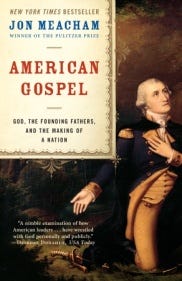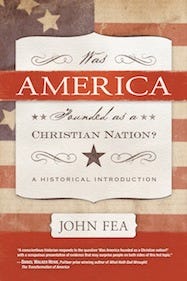Engaging Jon Meacham and John Fea on Religion and Politics in America

Last week, a divided Supreme Court ruled to allow town boards to begin their sessions with prayer. Tellingly, both the majority and minority opinions, written by Justices Anthony Kennedy and Elena Kagen, respectively, appealed to the founding fathers to support their views for and against prayer in town board meetings.
Appeals to history to support contemporary political opinions are not going away anytime soon. So what does America’s founding have to say about religion in the U.S. today? This question continues to be debated from our local schools to the highest levels of our government.
In considering this question, I’d like to engage two noteworthy discussions that seek to provide historical perspective on our nation’s founding: Jon Meacham’s American Gospel: God, the Founding Fathers, and the Making of a Nation (Random House, 2006)—which I listened to in its audiobook version—and John Fea’s Was America Founded As a Christian Nation?: A Historical Introduction (Westminster John Knox, 2011). Both Meacham and Fea address the Christian America thesis, yet they approach the question from different angles.
Meacham is executive editor and executive vice president at Random House and the former managing editor of Newsweek, and he has written a number of bestsellers on American history, including biographies of Andrew Jackson and Thomas Jefferson. With a foot in the editorial world, he writes American Gospel with engaging prose, and his work exposes the reader (or listener) to several primary source texts, enriching our understanding of religion in American public life from the Puritans to the present.
Yet Meacham clearly writes with a purpose: To convince the reader that the best approach to religion and politics in America is the middle road. He argues that the founding fathers achieved a wise, if delicate, balance between a completely secular state and a state-established religion. In the twenty-first-century debates over religion in the U.S., Meacham believes this middle road can provide Americans a way forward.
Specifically, Meacham rejects the extreme left view that the founders of the U.S. wanted to erect a godless society free from all forms of religion, but he also rejects the extreme right view that the founders were firm Christian believers who aimed to create a Christian America. What Meacham commends to Americans today is “public religion,” to borrow a phrase from Benjamin Franklin (25). Put another way, in Meacham’s view, religion is good for society as long as it promotes morality—an idea advocated by many of the founders and subsequent presidents.
From a political standpoint, this moral vision of religion may be the best we can do in a religiously pluralistic society. But theologically, Christians must embrace the gospel, which holds exclusivist religious claims. As Tim Keller rightly observes, “The world thinks that moral religion is a good thing for society. But the world is offended by the cross” (Galatians for You, 180). For Christians, simply being moral is never enough.
The reality is that all religions hold claims that are incompatible with other religions’ claims. Religious liberty allows others to hold different religious views from us without forcing our views on them, but religious liberty must also allow various religions to engage each other on their differences. That is, while religious tolerance allows temporal peace, religious truth explores eternal places. We ought to embrace the former while we debate the latter, seeking not only freedom in this world as we improve this world, but also freedom in the next.

John Fea, associate professor of history at Messiah College, directly discusses the question of a Christian America in his book, but instead of promoting a particular political approach to religion, he emphasizes a historical approach to the question.
Fea engages the question posed by the book’s title from three angles. First, he traces the history of the idea that the U.S. is a Christian nation from the period of the early republic down to our own day when many in the religious right vigorously defend the claim that the U.S. was founded as a Christian nation.
Second, he explores the events surrounding the American Revolution to understand the relationship between Christianity and the War for Independence. Fea sets the question in the context of British colonial societies, the events leading to the Revolution, the foundational documents of the United States (the Declaration of Independence and the Constitution), and the debates surrounding religious liberty and disestablishment.
Third, he takes a close look at the religious beliefs and practices of the nation’s founders, including George Washington, John Adams, Thomas Jefferson, and Benjamin Franklin, which reveals that the more renowned founders held a common interest in religion’s ability to promote morality, but failed either to profess orthodox theology or live up to their own moral standards. Even the more orthodox Christian founders—such as John Witherspoon, John Jay, and Samuel Adams—often relied heavily on other sources for their revolutionary political ideology, particularly Enlightenment thought and the ancient philosophy of republicanism.
In the end, Fea seeks not to answer the question posed by the book, but rather to show that the answers are complex. Clearly, the founding fathers never established Christianity as the state religion, and it would be foolish to argue that they did. However, neither did they seek to eliminate religion altogether, and in fact Christianity played a significant role not only in religious affairs through prayers in government buildings, but more significantly in the larger culture. Thus, answering the question, “was America founded as a Christian nation?” requires careful definition of terms and a recognition of complexity in the answer.
In comparison, Meacham’s work is best for promoting a middle road between those who would make America a Christian political entity and those who would remove religion from American public life altogether. In other words, American Gospel calls us to embrace the influence of religion in American life without elevating any one religion or denomination to ultimate power. In short, it is a historical reflection on the value of religious liberty.
Fea’s work is a compelling introduction to the work of historians that explores the question of religion and America in its complexity, and it helpfully dispels myths and nurtures discussion, especially in the classroom. In fact, after using it in a class on American religion this past semester, one of my students said it was “one of the top five books” he had ever read. Unlike Meacham’s work, Fea seeks not to promote a political viewpoint, but to promote careful historical thinking about the past and its meaning for today.
While history inevitably drives us to consider how we should approach all kinds of questions in our contemporary context—such as allowing prayer in town board meetings—history will serve us best when we explore it in all its complexity.

